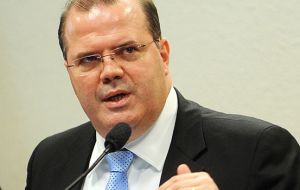MercoPress. South Atlantic News Agency
In a divided vote, Brazil's central bank raised the Selic rate 25 points to 11.25%
 “Inflation risks have become less favorable since its last rate-setting meeting in early September”, said the Copom board headed by Alexander Tombini
“Inflation risks have become less favorable since its last rate-setting meeting in early September”, said the Copom board headed by Alexander Tombini  The surprise hike could also pave the way for the government to raise fuel prices, helping state-run oil company Petrobras recover, anticipate analysts
The surprise hike could also pave the way for the government to raise fuel prices, helping state-run oil company Petrobras recover, anticipate analysts In a surprise move and in divided vote (5 to 3), Brazil's central bank monetary board, Copom, decided to raise its benchmark Selic rate by 25 basis points to 11.25%. A majority of economists and analysts anticipated that the bank would opt to keep rates unchanged.
A stagnant economy and inflation are serious challenges for the Rousseff administration in its second mandate and where one of the main targets of opposition candidate Aecio Neves during the runoff campaign in which he was defeated by a minimum margin.
The bank said inflation risks had become less favorable since its last rate-setting meeting in early September due to more intense price increases.
“For the Committee since its last meeting, among other factors, the intensification of relative prices adjustments in the economy has turned the balance of inflation risks less favorable. Because of this, the Committee considered convenient to adjust monetary conditions so as to guarantee, at a lower cost, the prevalence of a more benign scenario for inflation in 2015 and 2016”, said the bank in its release.
Members voting for an increase of the Selic rate to 11.25% were: Alexandre Antonio Tombini (President), Aldo Luiz Mendes, Anthero de Moraes Meirelles, Carlos Hamilton Vasconcelos Araújo and Sidnei Corrêa Marques. Voting to keep the Selic rate unchanged at 11% were Altamir Lopes, Luiz Awazu Pereira da Silva and Luiz Edson Feltrim.
Inflation hovering above the official target ceiling of 6.5% has increased pressure on the central bank to raise borrowing costs. The central bank aims to keep inflation at the center of the target, between 2.5% and 6.5%.
Still, most economists had expected the bank to refrain from action until Rousseff announces changes to her economic team.
Brazilian exchange and stock markets have been volatile since Rousseff's re-election victory on Sunday, with some investors hopeful that the threat of a credit downgrade next year could force her to adopt more policies that are favorable toward business.
The surprise hike could also pave the way for the government to raise fuel prices, helping state-run oil company Petrobras recover from policies that have forced it to sell imported fuel at a loss to cap inflation, analysts say.
The most urgent task facing Rousseff's new economic team will be tightening the federal budget to ward off the threat of a credit downgrade next year. Less public spending in 2015 would ease inflationary pressure and allow the central bank to opt for a shorter rate tightening cycle.




Top Comments
Disclaimer & comment rules-

Read all commentsGreat news !! Only 3 days after the fat B has won her 2nd term, and the prime rate shoots up. Can't complain, the higher it goes, the more I earn. Next on the list is the price of gas...hope it goes through the roof, and takes a big chunk out of everyone's wages. After that will be the price of energy......and the addition of a few more taxes.....can't wait to hear all the complaining.
Oct 30th, 2014 - 05:06 pm 0Commenting for this story is now closed.
If you have a Facebook account, become a fan and comment on our Facebook Page!